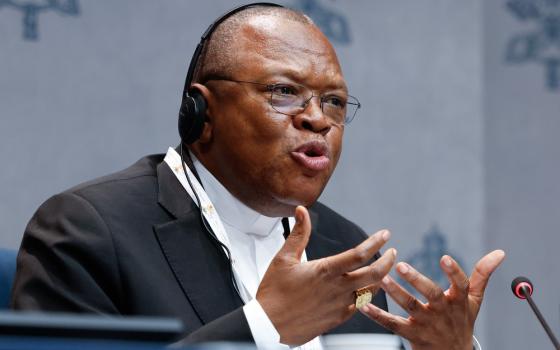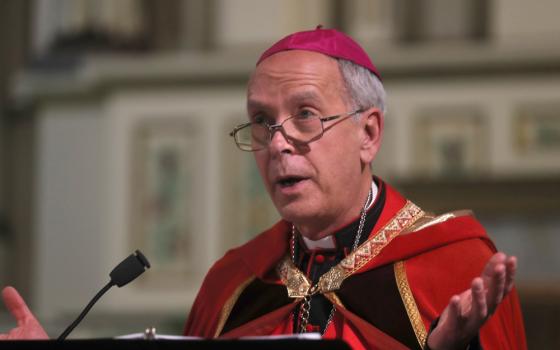Pope Francis made a surprise visit to a popular park in Rome Sunday for an event marking Earth Day.
Appearing amidst people strolling in Villa Borghese over an Italian holiday weekend, the pontiff took part in a panel discussion for the launch of an initiative to create a temporary village in the city to demonstrate more ecological ways of living.
Francis lauded the effort, telling those present that they are helping transform the deserts of modern day cities into forests more fit for human life. The pope spoke about the need for people to get close to one another, to not fear conflict, and to work together despite differences of religion or culture.
The pontiff also lambasted the "god of money," saying "those that can get close to adore this god get close, and those that cannot end up in hunger, sickness, exploitation."
Following is a translation of the pontiff's remarks, given off the cuff.
----------------------
Listening to you speak, two images came to me: the desert and the forest. I thought: these people, all of you, are taking the desert to transform it into a forest. They go where there is desert, where there is no hope, and make things that help the desert become a forest.
The forest is full of trees, full of green, but also disorganized -- but so is life! Moving from the desert to the forest is a beautiful work that you are doing. You are transforming deserts into forests! And then you will see how you can regulate certain things of the forest -- But there, there is life. Here no. In the desert there is death.
Many deserts in cities, many deserts in the lives of people without futures, because there is always -- and I underline a word said here -- there are always prejudices, fears. And these people must live and die in the desert of the city. You all make the miracle with your work of changing the desert into forest: Keep going ahead with it.
But how is your plan of work? I don't know. Let's get closer together and see what we can do. This is life! Because you have to take life as it comes. It is like the goalkeeper in soccer: picking the ball up from where they throw it, coming from here to there. There's no need for fear of life, fear of conflicts.
Someone told me once -- I don't know if it is true ... I have not investigated whether it is true or not --- that the word for conflict in the Chinese language is made of two characters: One that says 'risk' and another that says 'opportunity.' Conflict, it is true, is a risk but is also an opportunity.
We can take conflict like a thing from which to distance ourselves: 'No, over there is a conflict, I will stay away.' We Christians know well what the Levite did, what the priest did, with the poor man fallen on the street. They made a street not to see, not to get close to.
Whoever doesn't risk can never get close to reality: to know reality, even to know it with the heart, it is necessary to get close to it. Getting close is a risk, but also an opportunity: for me, and for the person I get close to. For me and the community I get close to.
I think of the testimonies that you have given, for example in the prison, with all your work. Conflict: Never, never, never, turn yourself away to not see the conflict. Conflicts must be taken on; bad things must be taken on to resolve them.
The desert is ugly -- that which is in the heart of all of us, that which is in the city, in the peripheries -- it is an ugly thing. .... But we must not fear going into the desert to make it into a forest; life exuberant is there, and you can go to dry many tears so that many may smile.
It makes me think of that Psalm of the people of Israel when they were in exile in Babylonia and they said: 'How can we sing our songs when we are in a foreign land?' They had the instruments, there with them, but they did not have joy because there were hostages in a foreign land.
But when they were freed, says the Psalm, 'we could not believe it, our mouths were filled with smiles.' And so it is in this transition from desert to forest, to life, there is the smile.
I'll give you a work to do at home: Look one day at the face of people when they're out on the street. They are worried, each one closed into themselves, lacking a smile, lacking tenderness -- in other words, social friendship; we are missing this social friendship.
Where there is not social friendship, there is hatred, war. We are living a 'third world war in pieces,' everywhere. Look at the map of the world and you will see this. But the social friendship, you make it with forgiveness -- the first word -- with forgiveness. Many times you do it by getting close: I get close to that problem, that conflict, that difficulty...
And there is also another thing ... gratuitousness. You do social friendship with gratuitousness, and this wisdom of gratuitousness you learn in sport, in game, with art, with the joy of being together, getting close.
It is a word, gratuitousness, to not forget in this world, where it seems like if you do not pay you do not live, where the person, man and woman, that God has created truly as the center of the world, for being truly at the center of the economy, are chased out and at the center we have a beautiful god, the god of money.
Today at the center of the world there is the god of money and those that can get close to adore this god get close, and those that cannot end up in hunger, sickness, exploitation. Think of the exploitation of children, of young people.
Gratuitousness: It is it the keyword. Gratuitousness that says yes I may give my life as it is to go with others and make this desert become a forest. Gratuitousness, this is a beautiful thing!
And forgiveness, also, forgiving. Because rancor, resentment go far away with forgiveness. And then always constructing, not destroying; constructing.
These are the things that came to mind. And how do you do this? Simply in knowing that we all have something in common; we are all human. And in this humanity we can get close to work together. 'But I am of this religion, of that one...' It does not matter! Go ahead to work together. Respect each other; respect each other! And then we will see this miracle: the miracle of a desert become a forest.
Thank you so much for all that you do. Thank you.
[Joshua J. McElwee is NCR Vatican correspondent. His email address is jmcelwee@ncronline.org. Follow him on Twitter: @joshjmac.]


